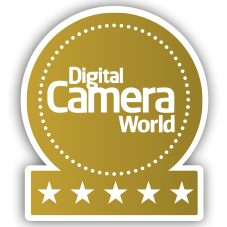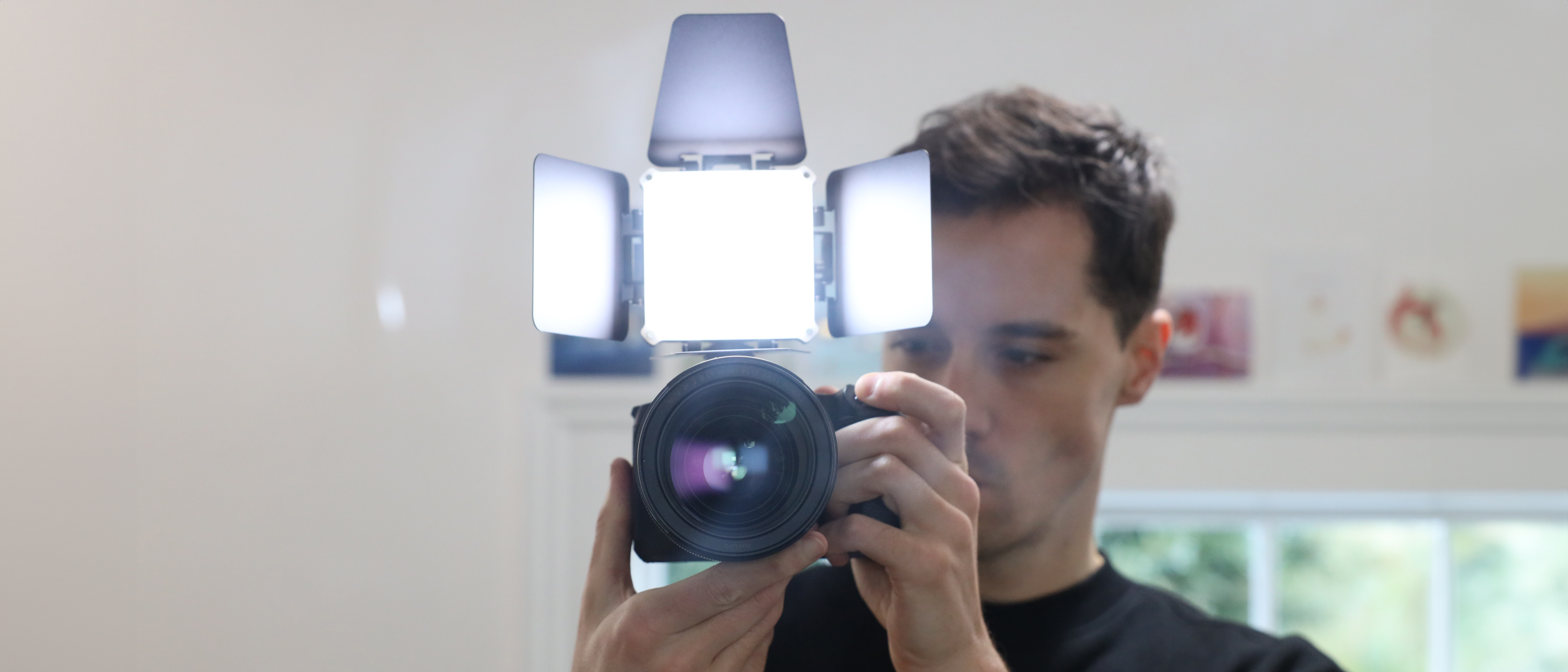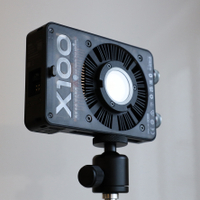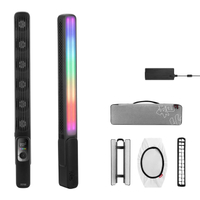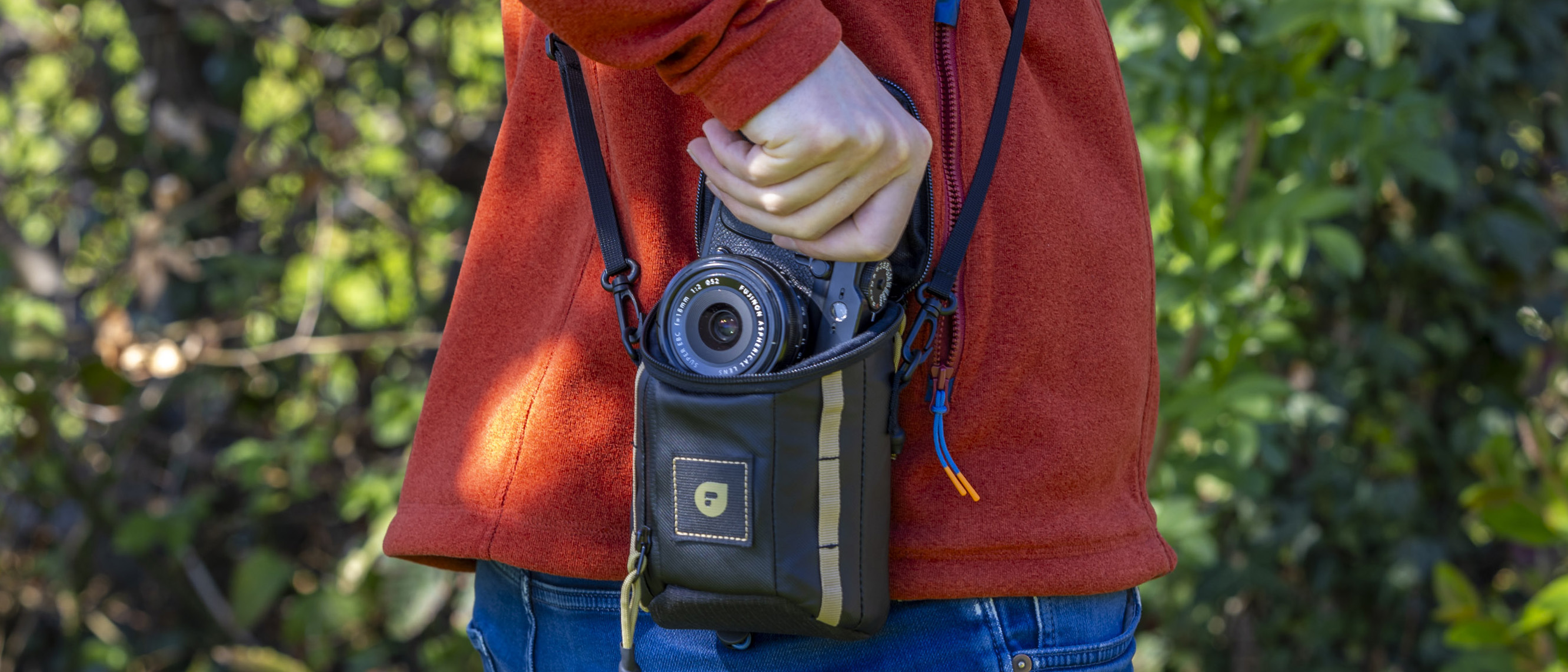Digital Camera World Verdict
Offering nearly everything any creative could possibly want in a small LED light panel, including variable CCT, HSI, lighting effects, and precise color tuning – the Zhiyun Fiveray M20C stands out as one of the best options right now for any vlogger or filmmaker looking for an affordable way to quickly improve their footage.
Pros
- +
Powerful enough for small spaces
- +
RGB spectrum lighting
- +
Lots of creative lighting effects
- +
Magnetic mounting and magnetic accessories
Cons
- -
Not as powerful as similar-sized COB lights
- -
Accessory magnets are a little weak
- -
Minor charging issue
Why you can trust Digital Camera World
Zhiyun is perhaps better known to most for making some of the best camera gimbals or best smartphone gimbals around, but in recent years the company has pushed into lighting in a big way with its take on the latest LED lighting tech, with a unique Zhiyun design twist.
Going after the blossoming content creation market, Zhiyun’s lights combine distinctive style, with compact design, and as much power as can be squeezed out as possible. This has paid off in dividends, with products like the Zhiyun Molus X100 being one of the best video lights I used last year.
Not resting on their laurels, Zhiyun has a new duo of lights for creators – the Zhiyun FIVERAY M20, a pocket-sized LED panel with a variable white balance, and the FIVERAY M20C, the full-color equivalent – which is the version of the M20 light I am testing here.
Although based around LED technology, LED panels differ from Zhiyun’s more recent lights which have featured COB (chip-on-board) LED tech. The main difference is the layout of the light emitting diodes (or LEDs) – in a COB light these are tightly packed together, offering a more powerful, beam of light that is more energy efficient, so can be used in a smaller housing.
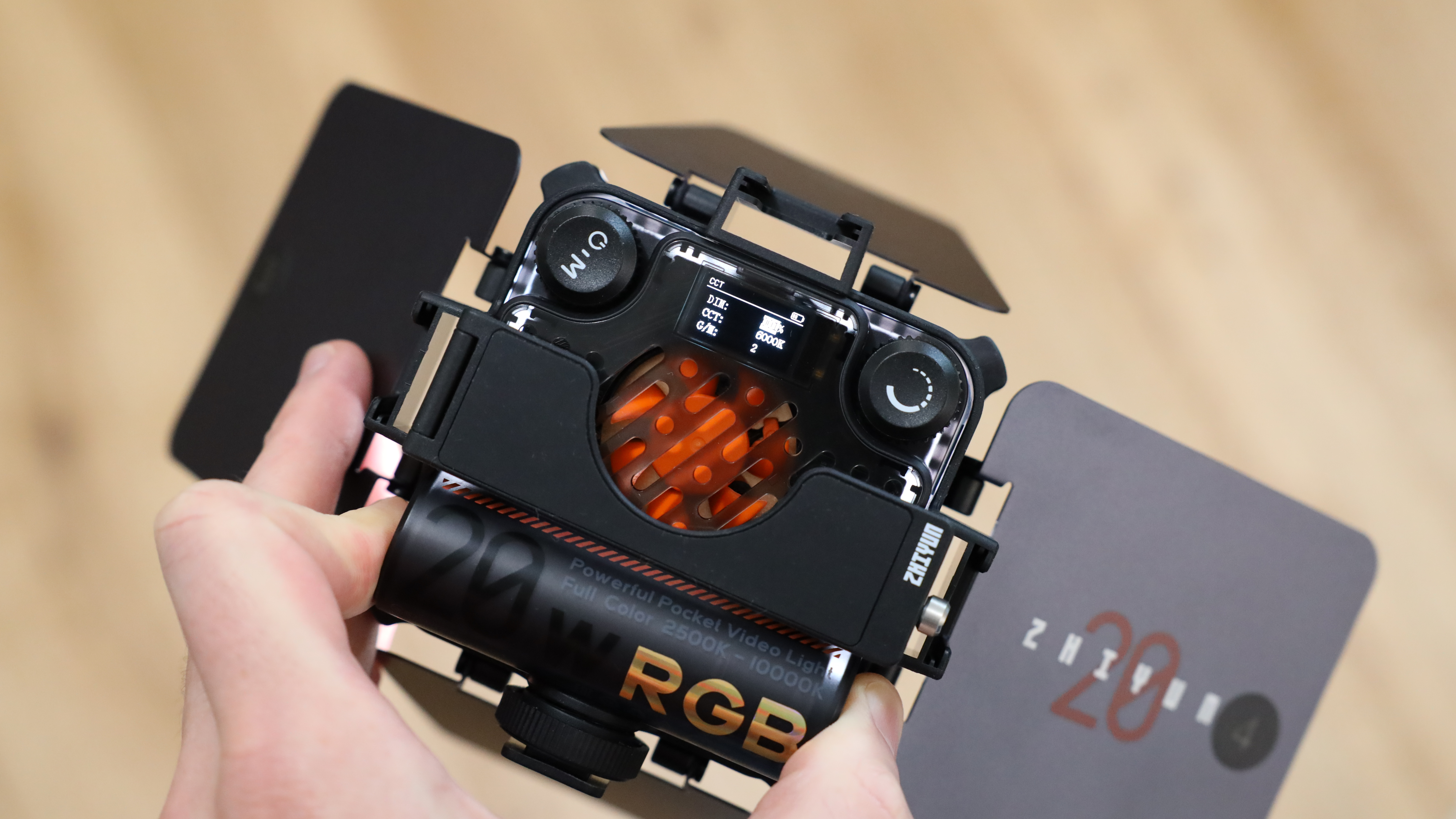
The downside of COB lights is they usually need light modifiers like a softbox or umbrella to spread the light evenly in a flattering and natural way, meaning that even though they are small, they often take up a lot of room once these accessories are attached.
LED panels spread the LEDs further apart over wider areas and can usually provide a more direct light with minimal light shaping accessories, this makes them better for mounting directly on a camera, or in close proximity to a subject where there isn’t a lot of space.
The FIVERAY M20C utilizes a small LED panel that should be perfect for creators looking for a quick and simple way to add some additional lighting to their vlogs and videos, but in a crowded market, how does the M20C compare?
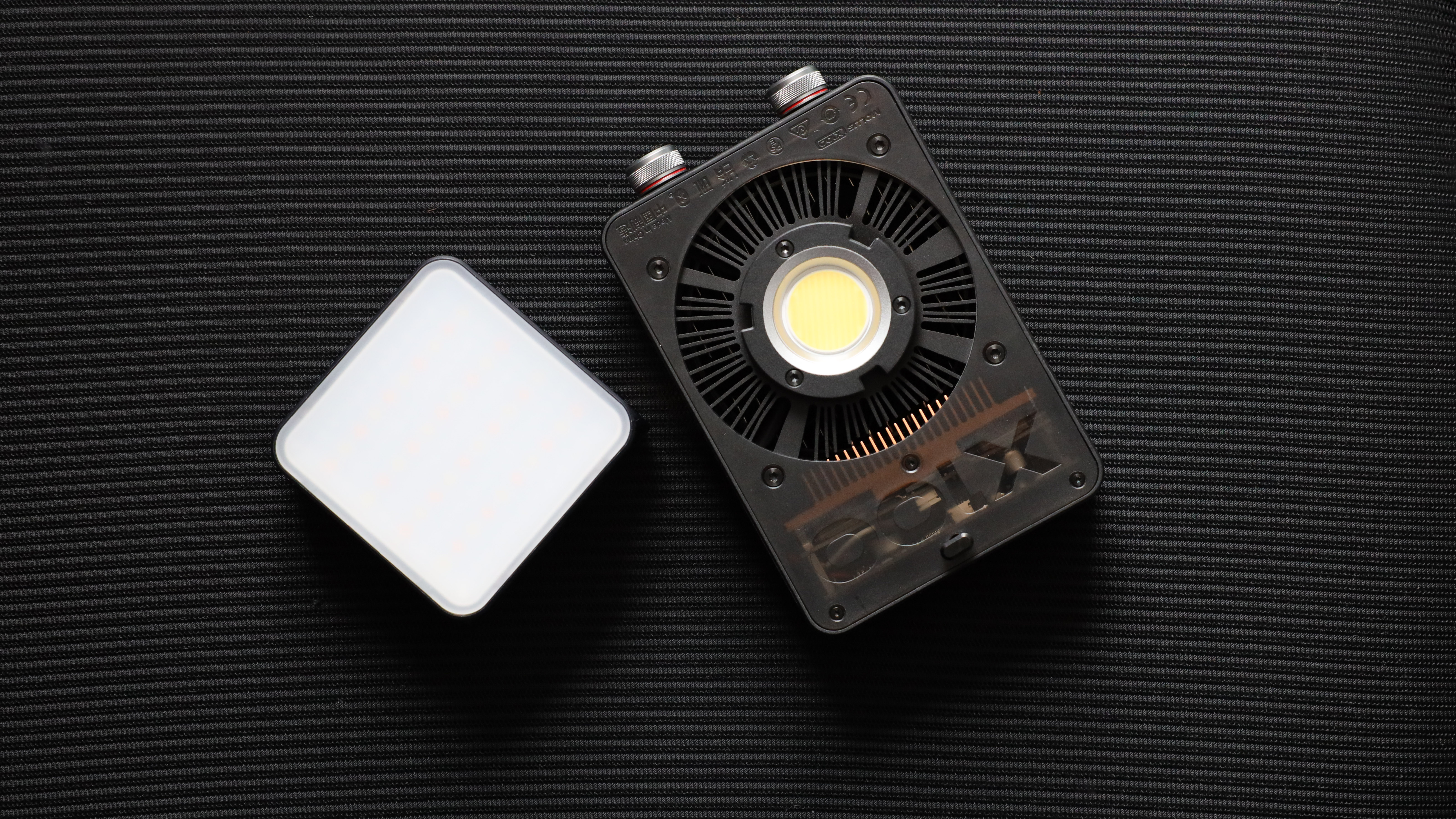
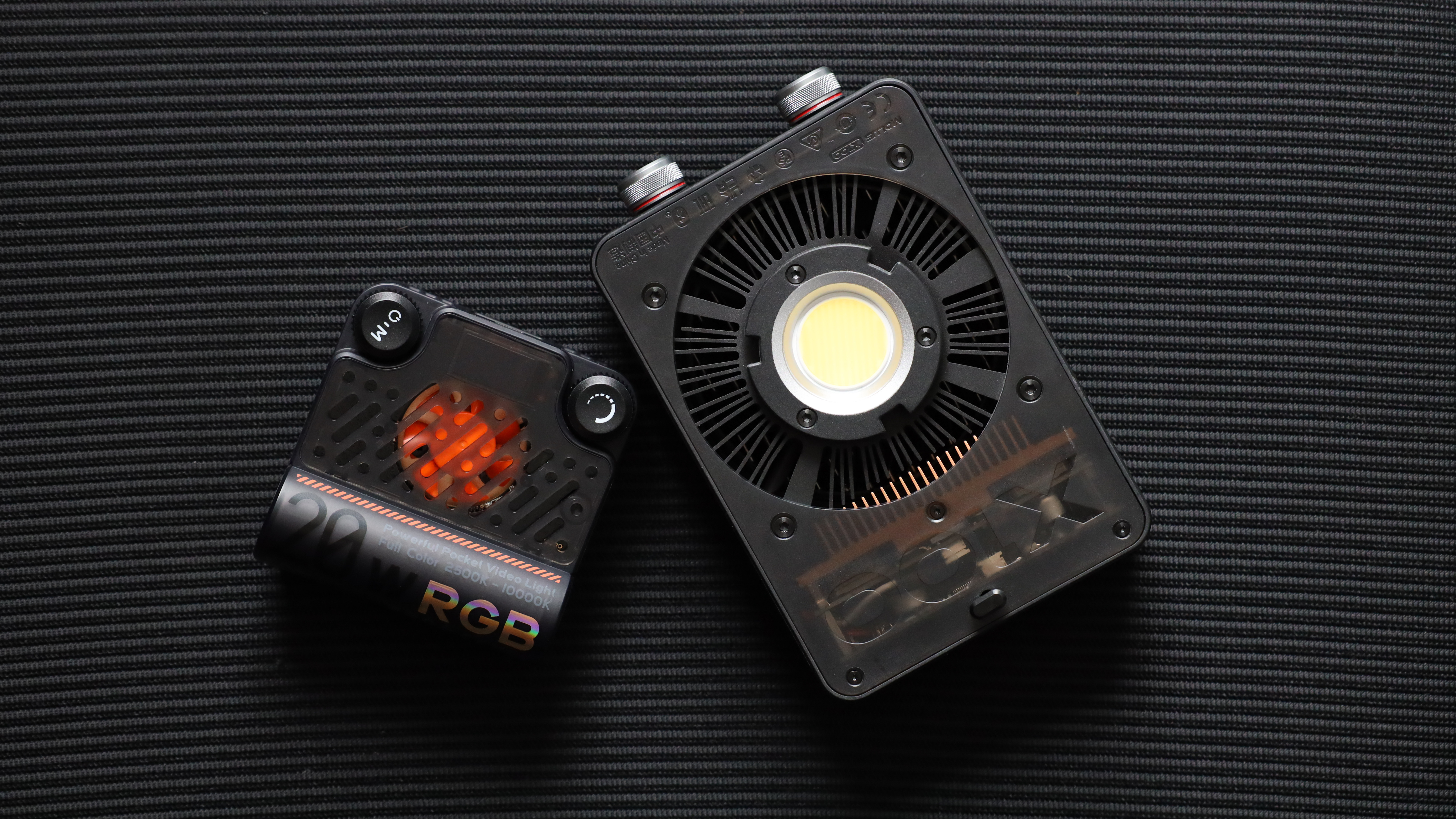
Zhiyun FIVERAY M20C: Specifications
| Power | 20W |
| Battery Capacity | 4500mAh |
| Charging Time | 2hr |
| Color Temperature Range | 2500k~10000k |
| Dimming Range | 0~100% |
| Illuminance (4300K/100%) | 539 (1m), 1950 (0.5m), 5300 (0.3m) |
| TLCI Index | ≥96 |
| CRI Index | ≥94 |
| RGB Illuminance (LUX, 1m) | R 255, G 280, B 103 |
| Weight | 200g |
| Size (WxDxH) | 7.8 x 7.8 x 3.6 cm |
Zhiyun FIVERAY M20C: Price & Availability
The launch price for Zhiyun FIVERAY M20C in the combo kit is $159 / £169, while the M20C light on its own is $129 / £139. This is exceptional value when you consider that the combo kit includes the light, cage, barn doors, diffuser, and honeycomb grid for a mere $30 extra. You can get small camera-mounted LED RGB panels for less, although these vary wildly in quality and consistency, and don’t offer the features and functionality of the Zhiyun.
If you really don’t think you will use the RGB colors at any point, then you can save a considerable $50 with the bi-color-only version of the M20 costing $109 / £119 for the FIVERAY M20 Combo Kit.
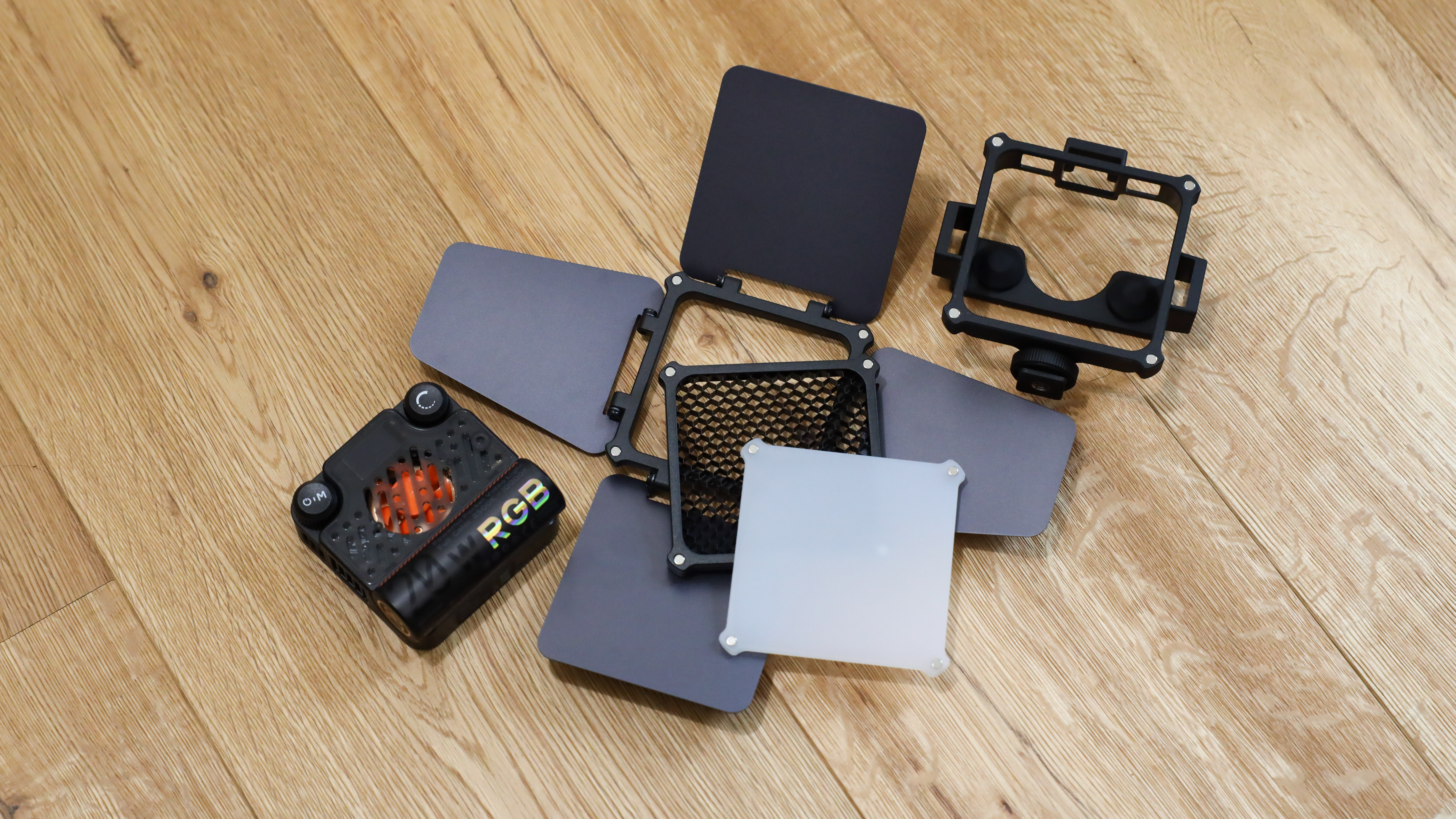
Zhiyun FIVERAY M20C: Design & Handling
There are so many small LED lighting panels on the market right now featuring the same design that it is near impossible to tell one brand apart from another. While the Zhiyun Fiveray M20C doesn’t completely reinvent the design, Zhiyun definitely puts enough of a spin on it that it looks distinct enough from everything else out there, which is unsurprising from a company that had given us bold designs like the Molus X100 and Molus G60.
I fell for the design of the M20C immediately upon pulling it from its box, the light just looks cool, although I can see that maybe the ‘sci-fi – steampunk’ design won’t be to absolutely everyone's tastes. But for the target audience of vloggers, YouTubers, and other creatives, I think this design is right on trend, and I’d be happy to feature it in my kit bag on looks alone.
The build of the main light is plastic-y although feels very sturdy, with hints of metal around the light in areas that might see a bit more wear and tear like the latch to open the cage, the barn doors, or the honeycomb grid, which are great touches that shown Zhiyun has put thought into these areas.
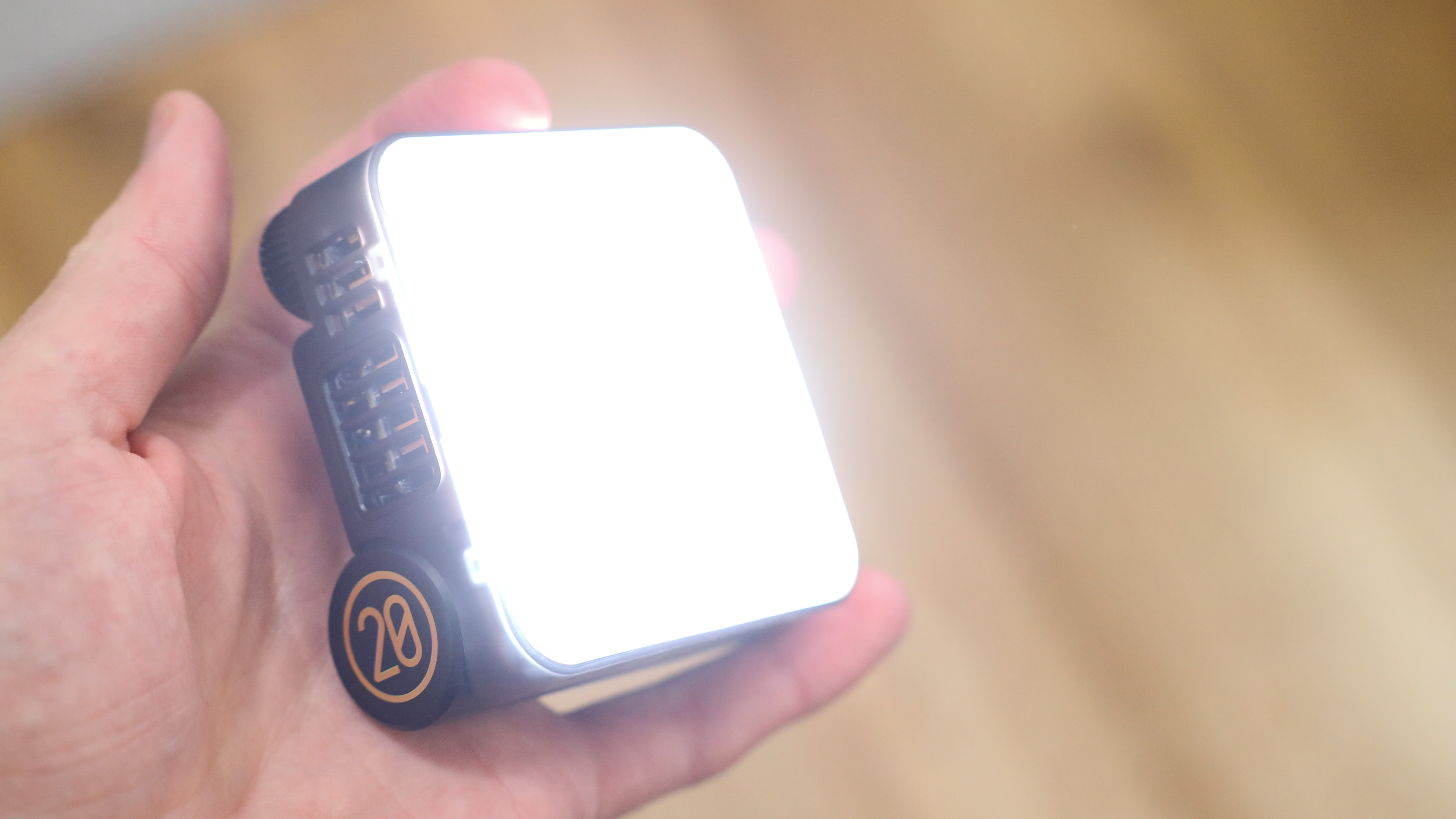
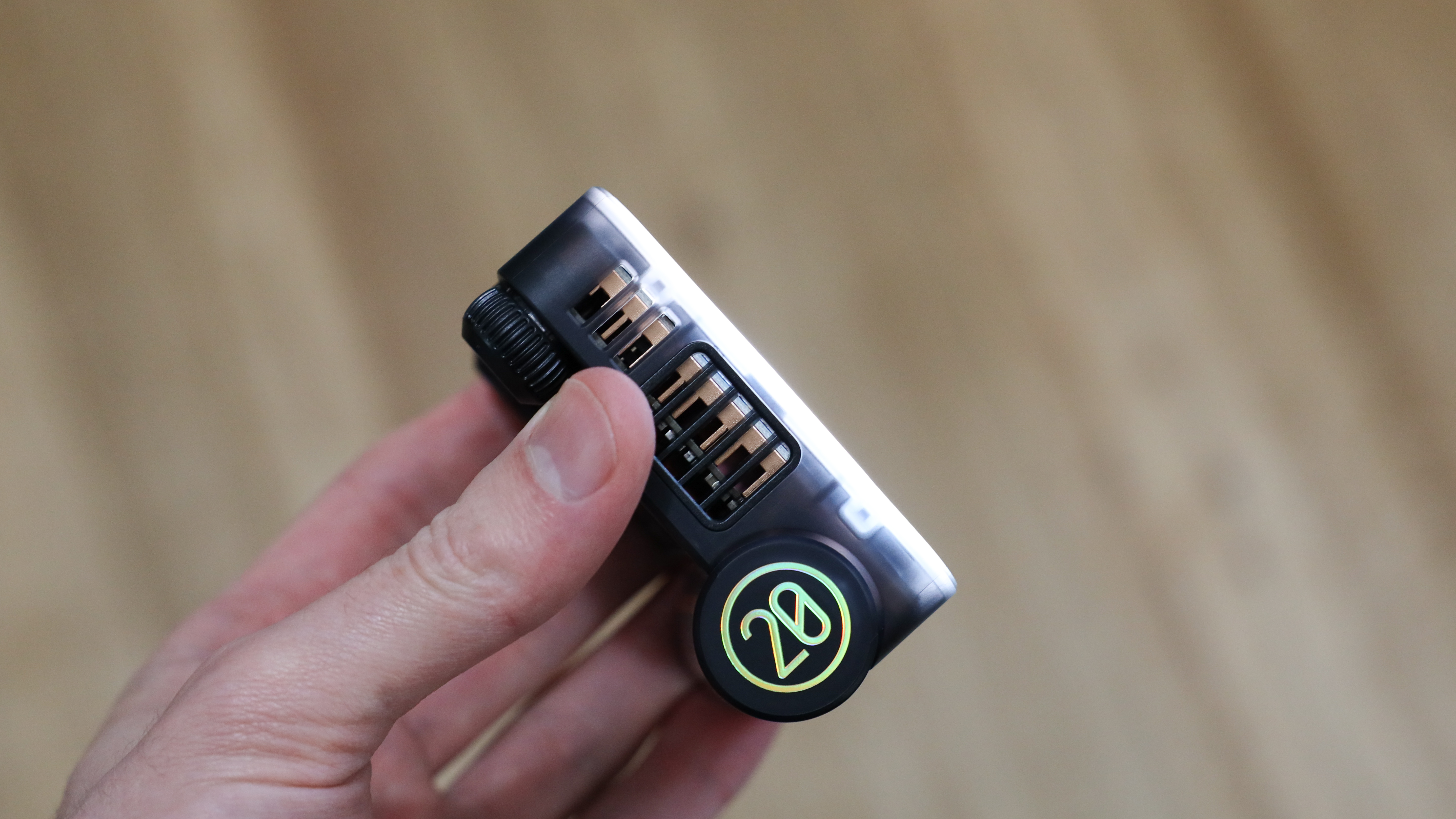
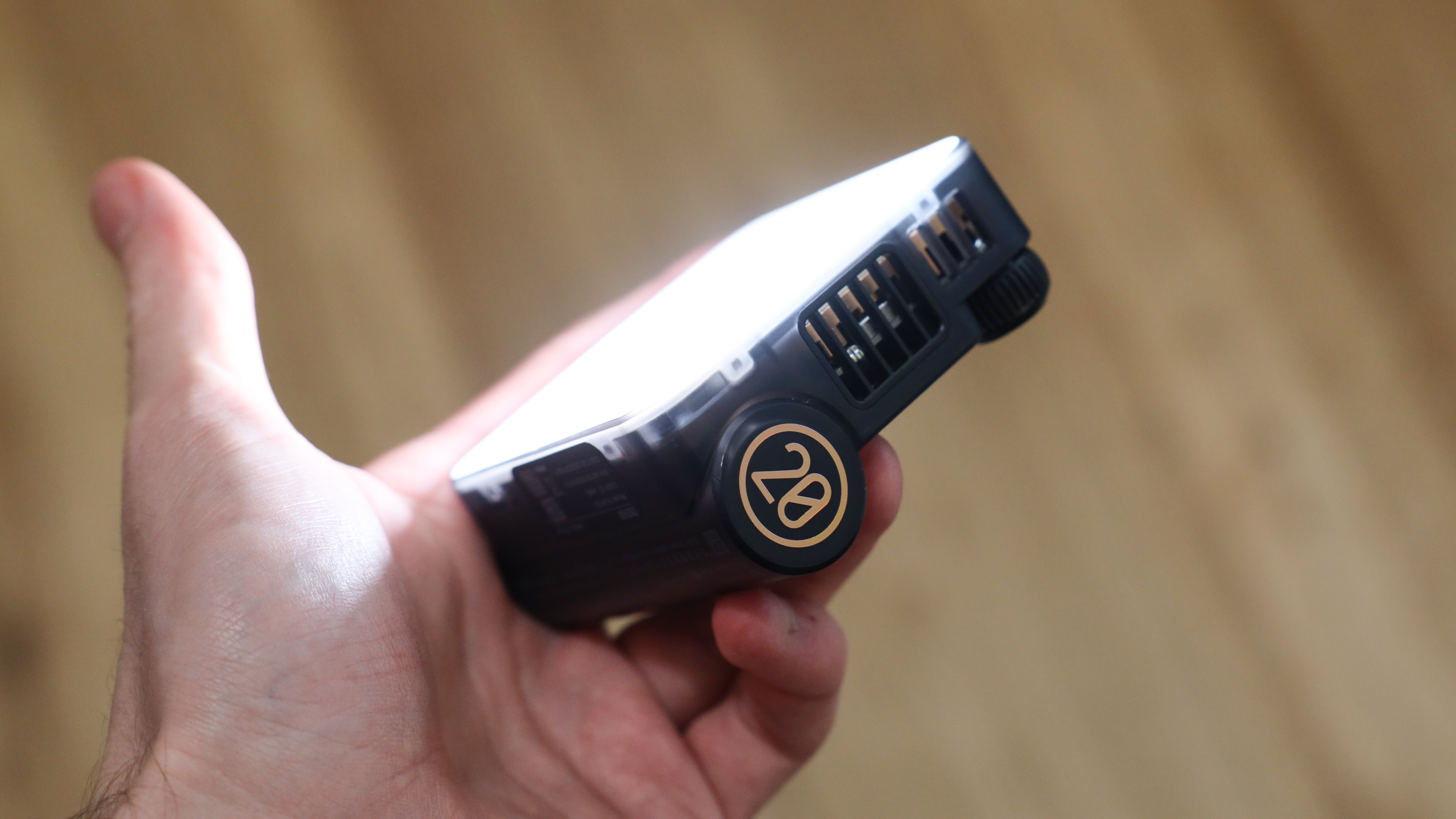
The cage and accessories
For mounting the light, on one side of the cage, there is a hot shoe mount for mounting the light directly onto a camera, or the mount has a standard 1/4in thread for mounting to a tripod or light stand. The other three sides all have cold shoe adapters for connecting several M20Cs together or attaching other accessories like microphones.
The M20C cage has a few other clever tricks up its sleeve. If you opt for the M20 or M20C Combo editions then you will get some accessories in the box including a diffuser, honeycomb grid, and barn doors which all mount magnetically to the front of the M20C cage. It's far from the first time I have seen this on a light, but I love this for small lights like this as it just makes attaching and detaching accessories so quick and easy.
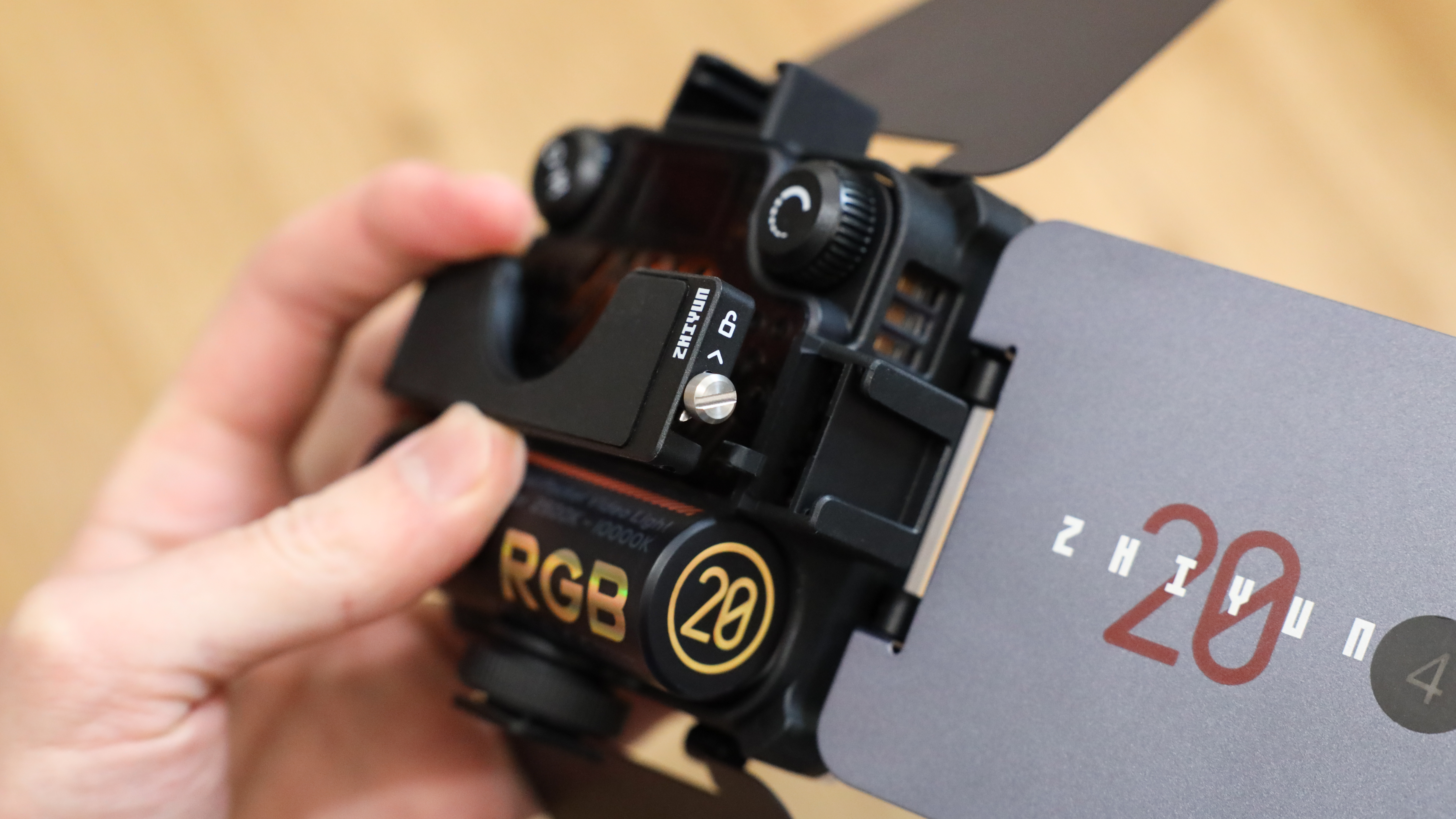
The magnets in the accessories are strong enough that they won’t drop off at any point in the shoot, however, an issue I found a lot is I would try to move the light by gripping the barn doors, and the magnetic connection is not strong enough to hold the weight of the entire light which sent it tumbling to the ground. Now this is as much my error as the product, but it is certainly something to bear in mind, and I tend not to think about these things when moving lights in the heat of the moment.
One of the coolest features is the cage has two magnets in the rear for mounting the light quickly to any magnetic surface, this also has been carefully considered with the rear of the cage featuring a soft silicon pad to try and prevent any damage to the magnetic surface you choose. I found the magnets have no trouble holding the weight of the light with all the accessories attached, but they are not so strong that I couldn’t whip the light off one-handed in a hurry.
Controls
The light is controlled by two buttons/dials on the rear, if you have used a lot of other LED lighting this will be a familiar control scheme, with the right-hand button/dial cycling through settings options or changing lighting modes, while the left dial changes the settings such as precise brightness control in one percent integers, or can be pressed in to quickly cycle through settings e.g. 0%-50%-100%.
This system works really well and is near impossible to get confused by. The dials offer some good resistance making them harder to turn accidentally, the dials also require a fair amount of turning to do much damage, so an accidental twist is only likely to knock the brightness by one or two percentage points. The only annoyance I found was trying to get from HSI color back to normal CCT you have to cycle through all the modes (including the settings menu).
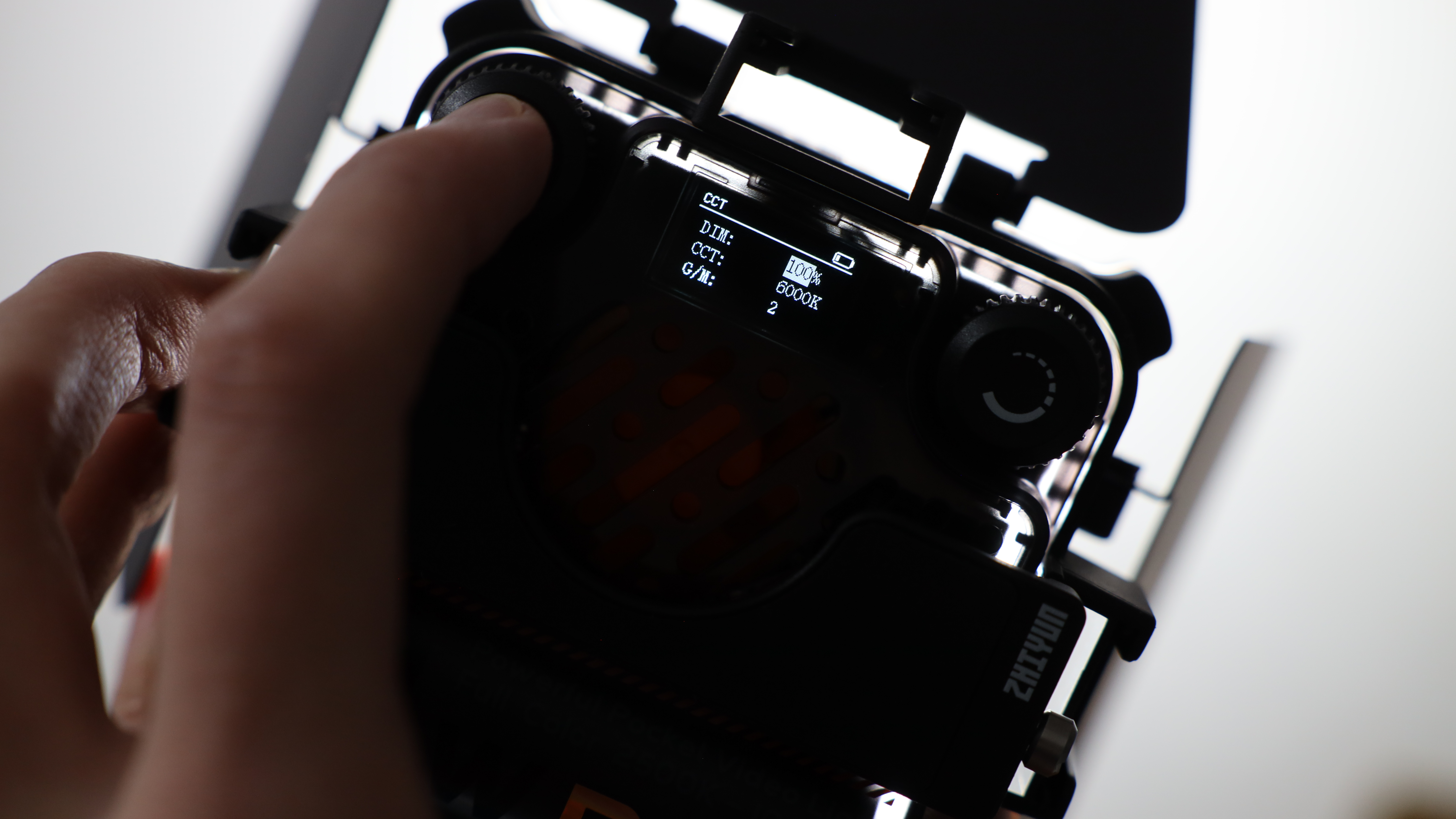
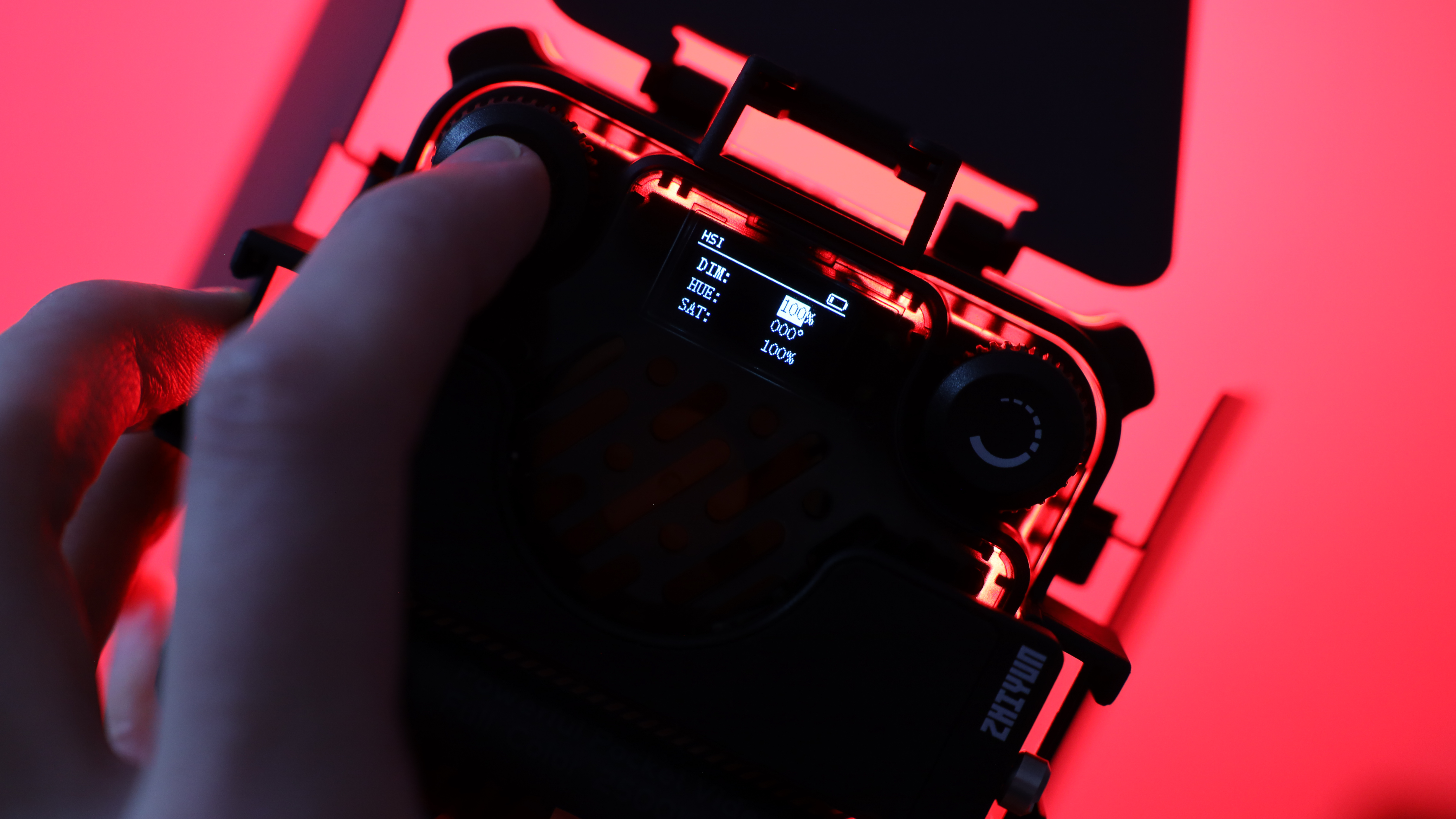
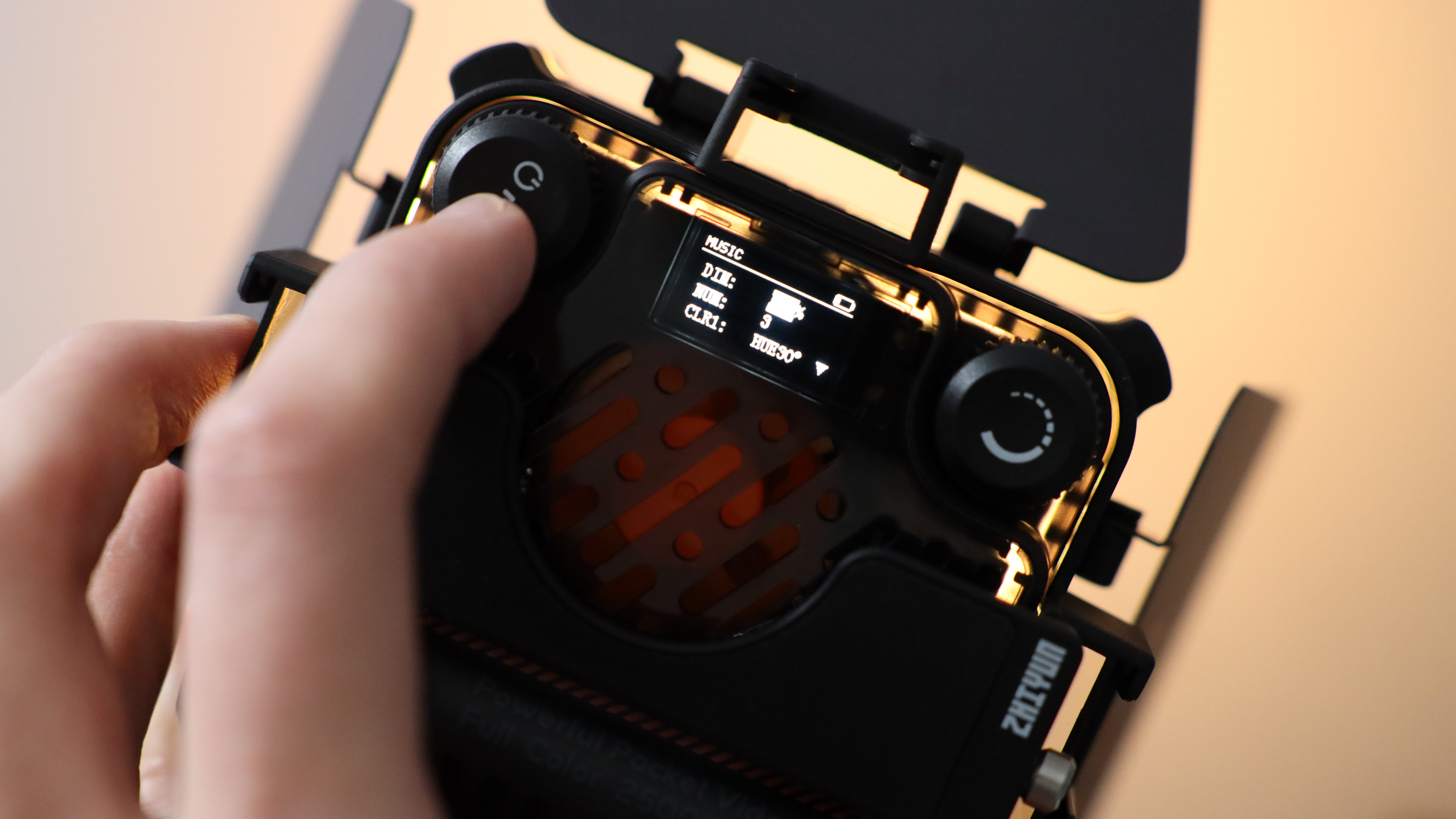
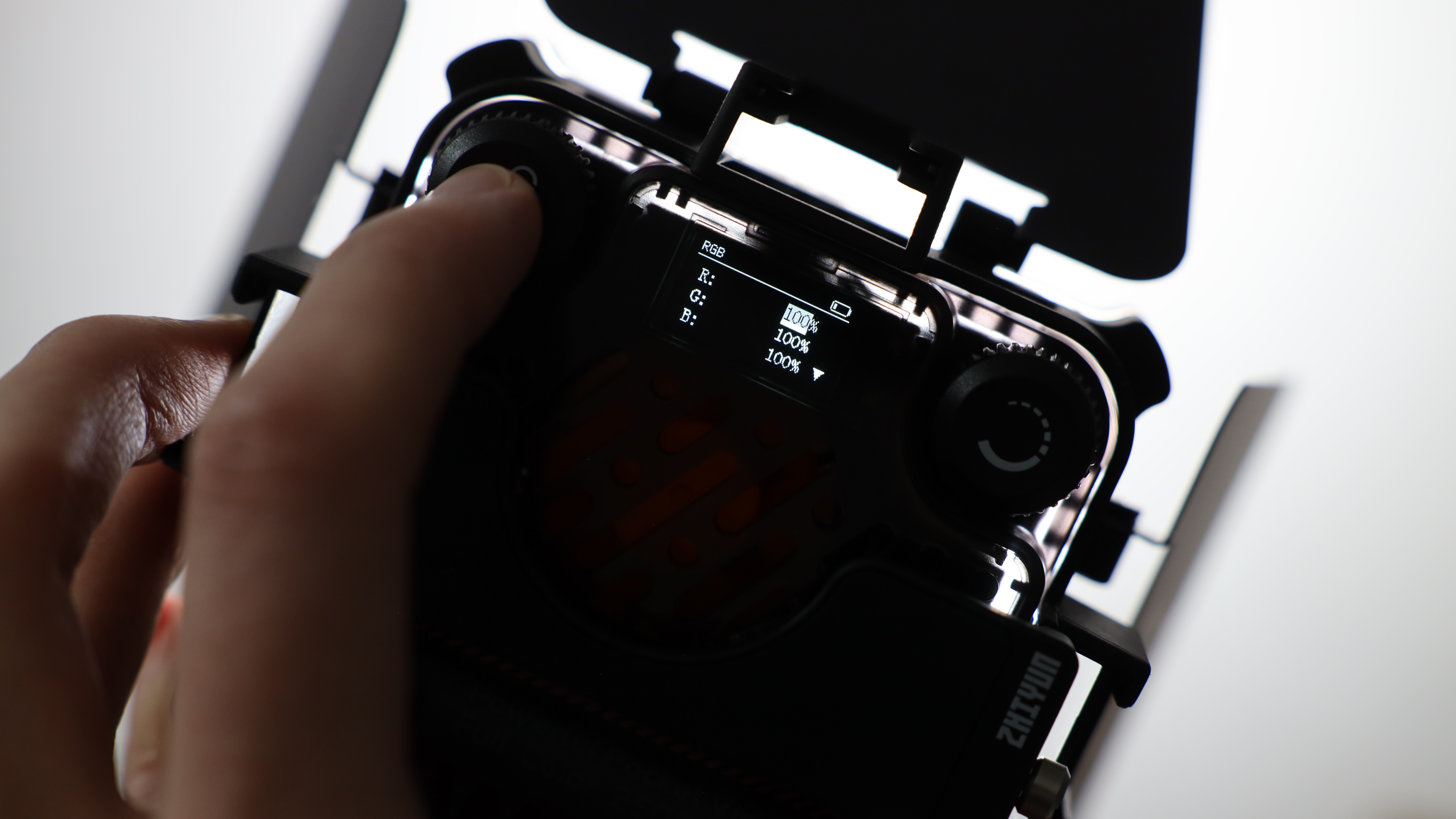
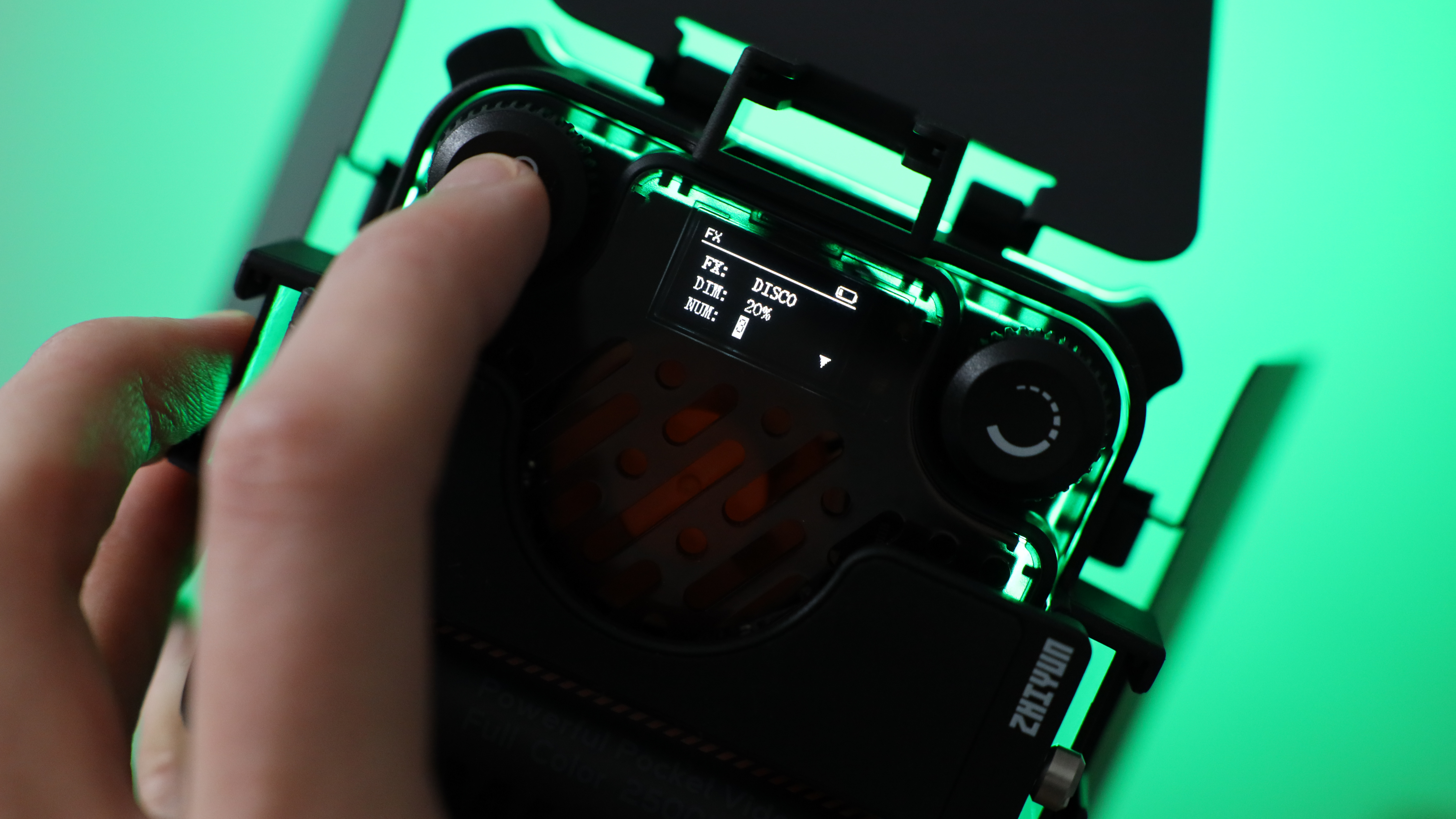
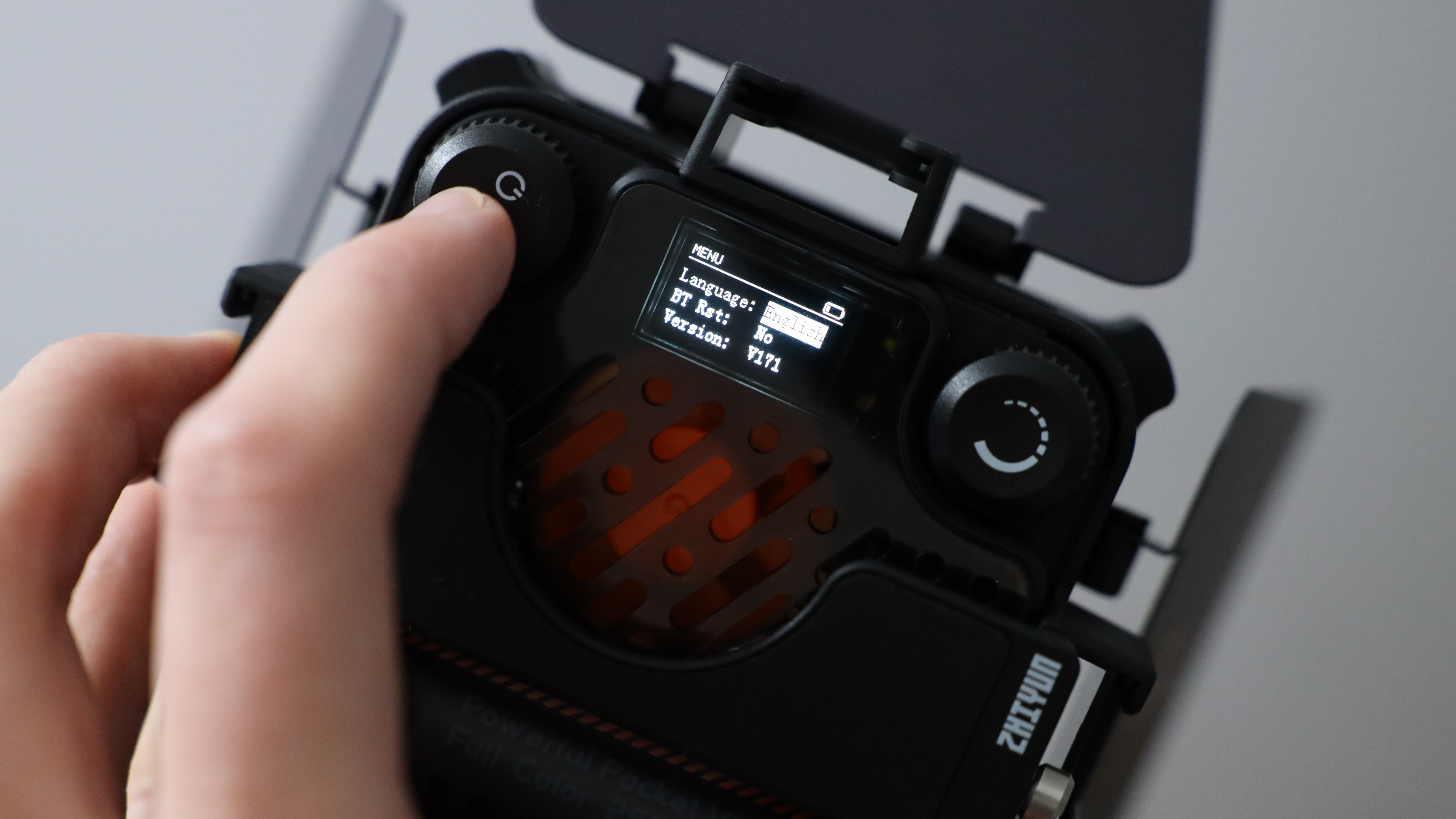
Zhiyun FIVERAY M20C: Performance
For an LED panel the amount of brightness the M20C outputs is impressive, this isn’t going to be lighting up a studio, but as a key light while filming a vlog, or offering background lights in video, this is an excellent choice. There are brighter COB options out there, even with Zhiyun’s own range it offers the Zhiyun Molus X100 (pictured below) or the Molus G60. Although these lights pack way more of a punch than the M20C, they lose the convenience of an inbuilt battery and don’t have any of the M20C’s HSI colors or lighting effects. So which one is for you is really a question of power versus convenience.
The quality of light is also good, again there are lights that offer a marginally more reliably accurate CRI color rating, but unless you are doing precise color-critical work then the M20C is more than good enough. If you do find that the green or magenta tones are a little off, the M20C offers a quick scale to adjust the hue to get a more pleasing measure. There is also a mode for controlling the RGB balance independently, which is very useful for anyone who needs a specific tone, although this definitely takes some know-how and practice.
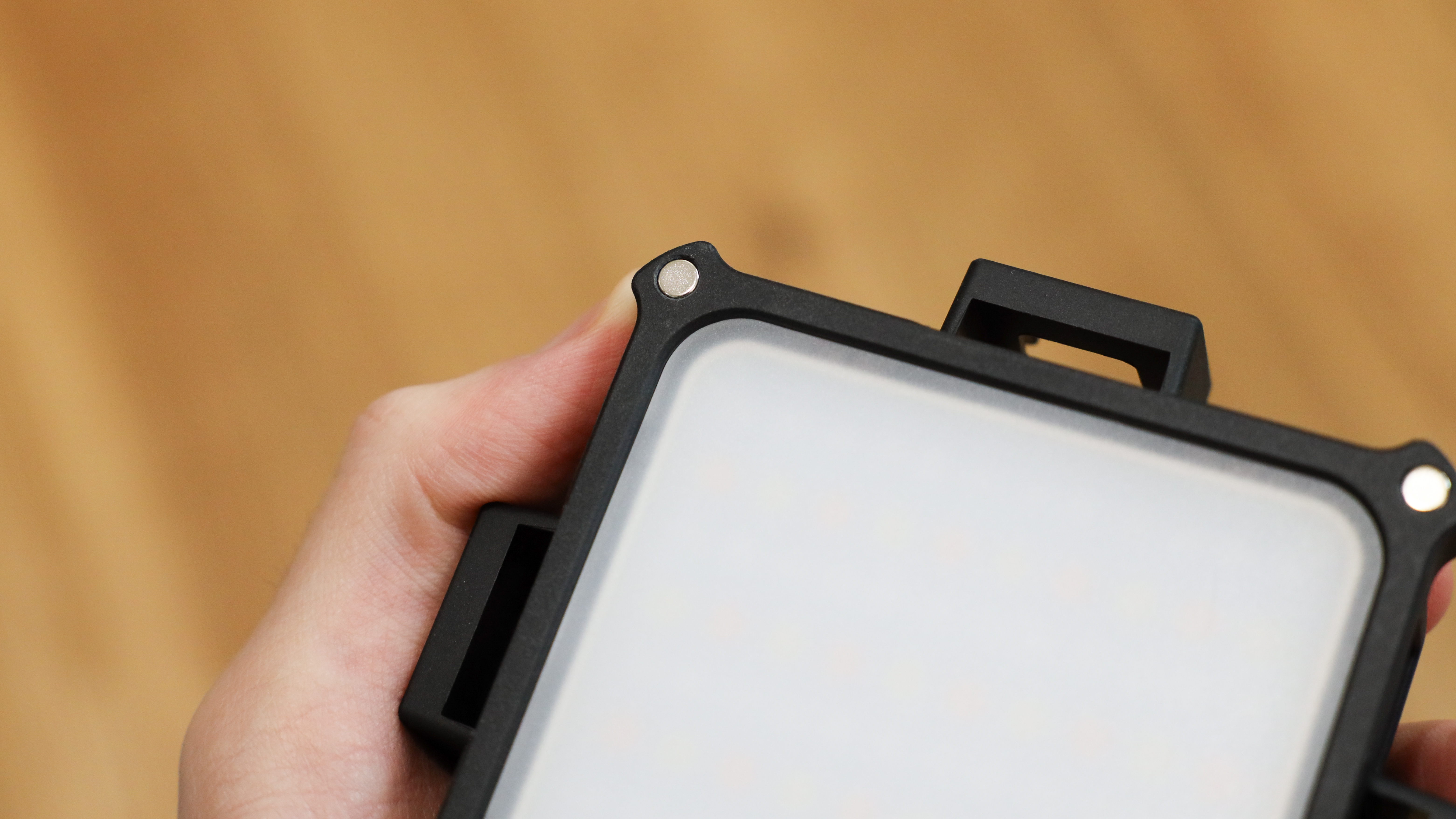
There is also the option to use the full HSI color spectrum. Colors on offer are very wide, and the M20C offers more than enough colors for most creators who are thinking about purchasing this light. The M20C claims to offer 360º of color, and this is mostly true, although sometimes the color jumps between two major hues rather than being a smooth transition. Colors do offer both brightness and saturation controls, so I was able to tune them to my perfect output.
Almost every lighting effect I could want has been included in the M20C, including classics like broken bulb, TV, lightning, and paparazzi, but also ones that make use of colors like police car and disco, you can also set the M20C to just cycle through all the hues. There is also a good level of control over all the effects and I could change the cycle speeds, number of colors, or just the overall look of the effect, there was so much to play with here.
Adapters
The clip-on light adapters mentioned earlier are mostly very good. The diffuser is the weakest of the bunch, there isn’t a huge amount of diffusion going on, but it does take a slight edge off the shadows, but don’t expect miracles. Although it does have the benefit of being slightly easier to look in the direction of the light for a subject without being nearly blinded.
The barn doors work exactly as you would expect for angling the light to be more direct, the shape of the doors also means they can be folded in to make an almost makeshift snoot.
The final adapter is the honeycomb grid, which is the best of the adapters, and is very effective at narrowing down the beam of light to be more direct on the subject, used in conjunction with the barn doors offers a lot of control over the light.
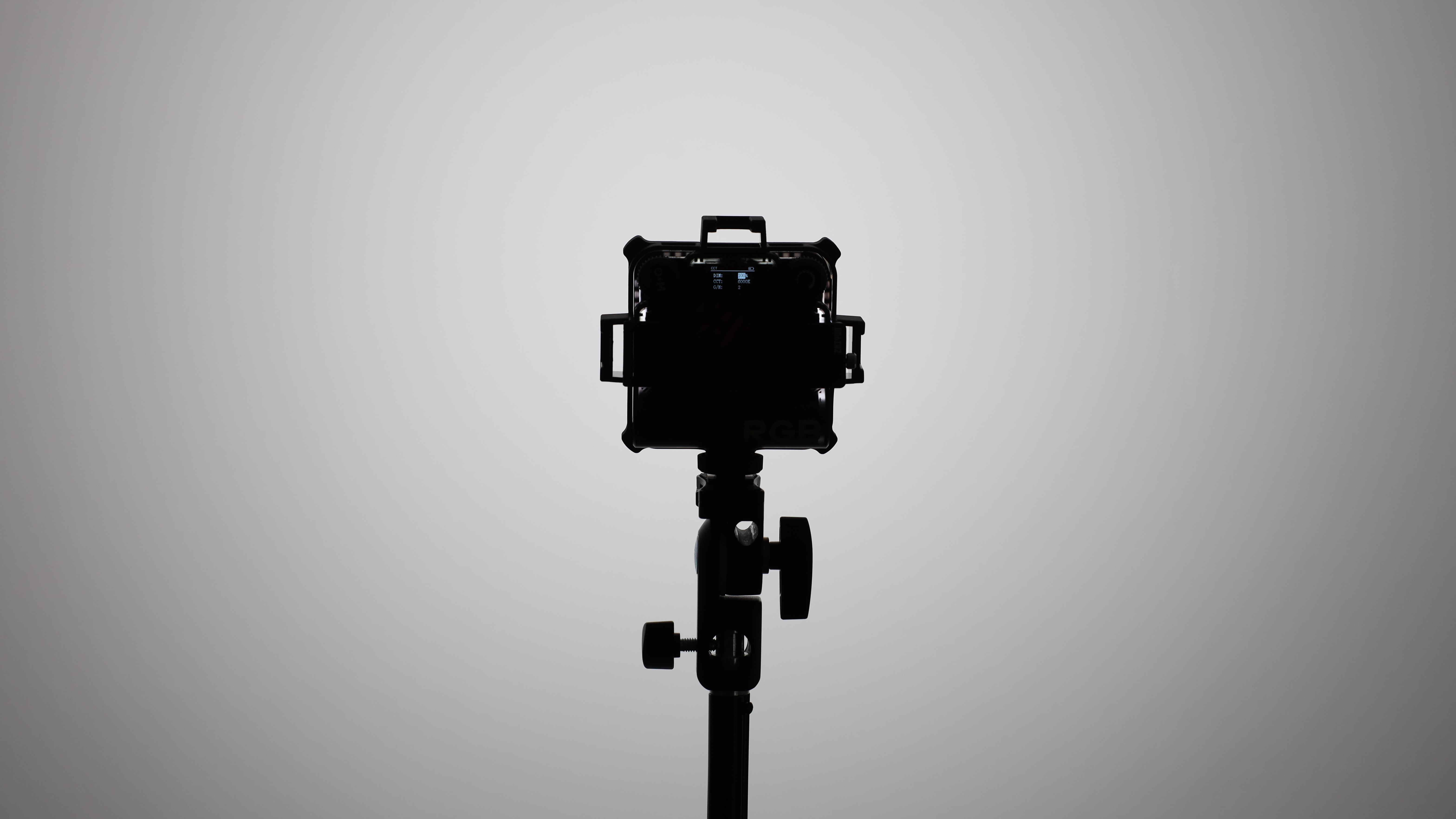
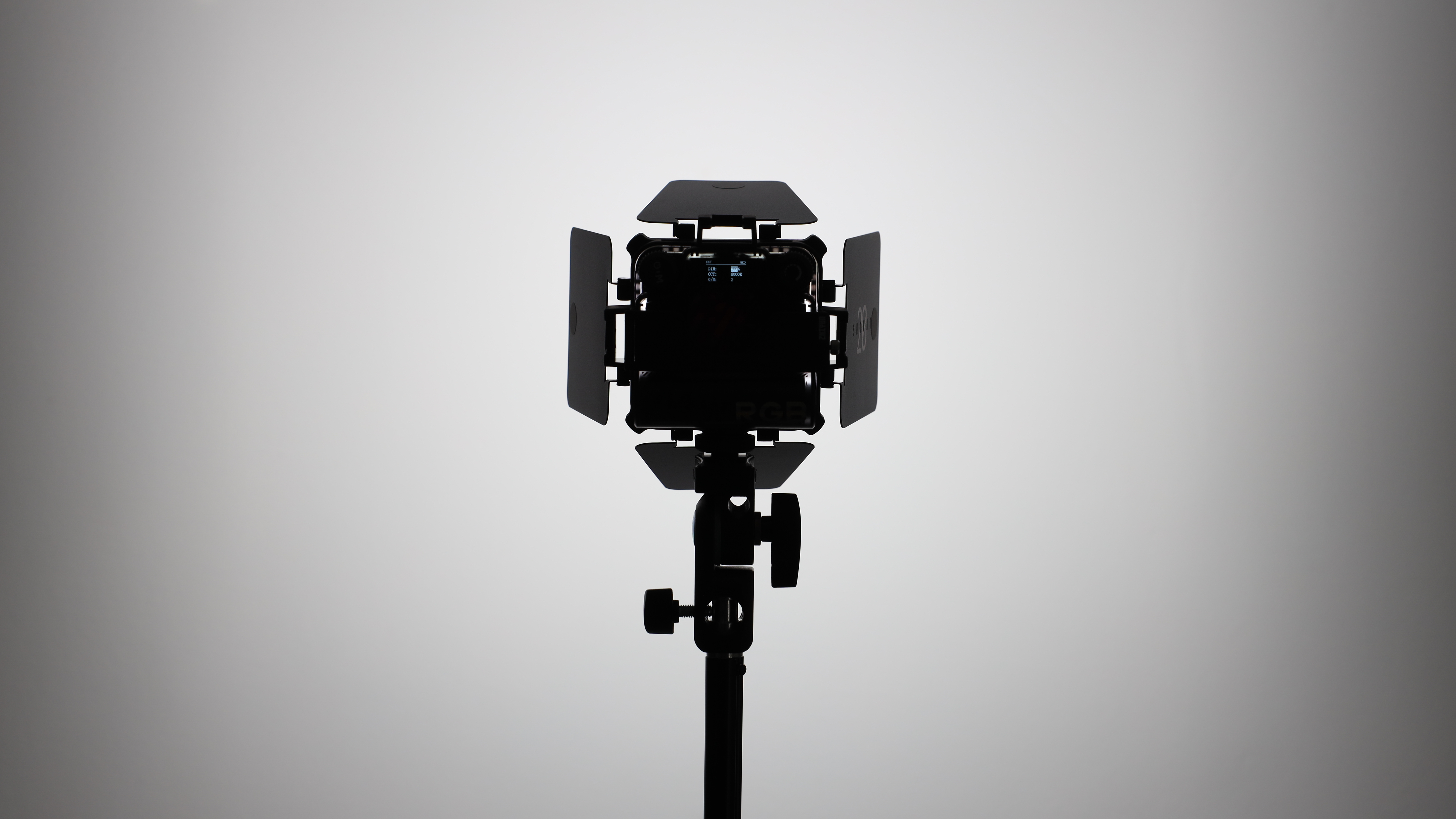
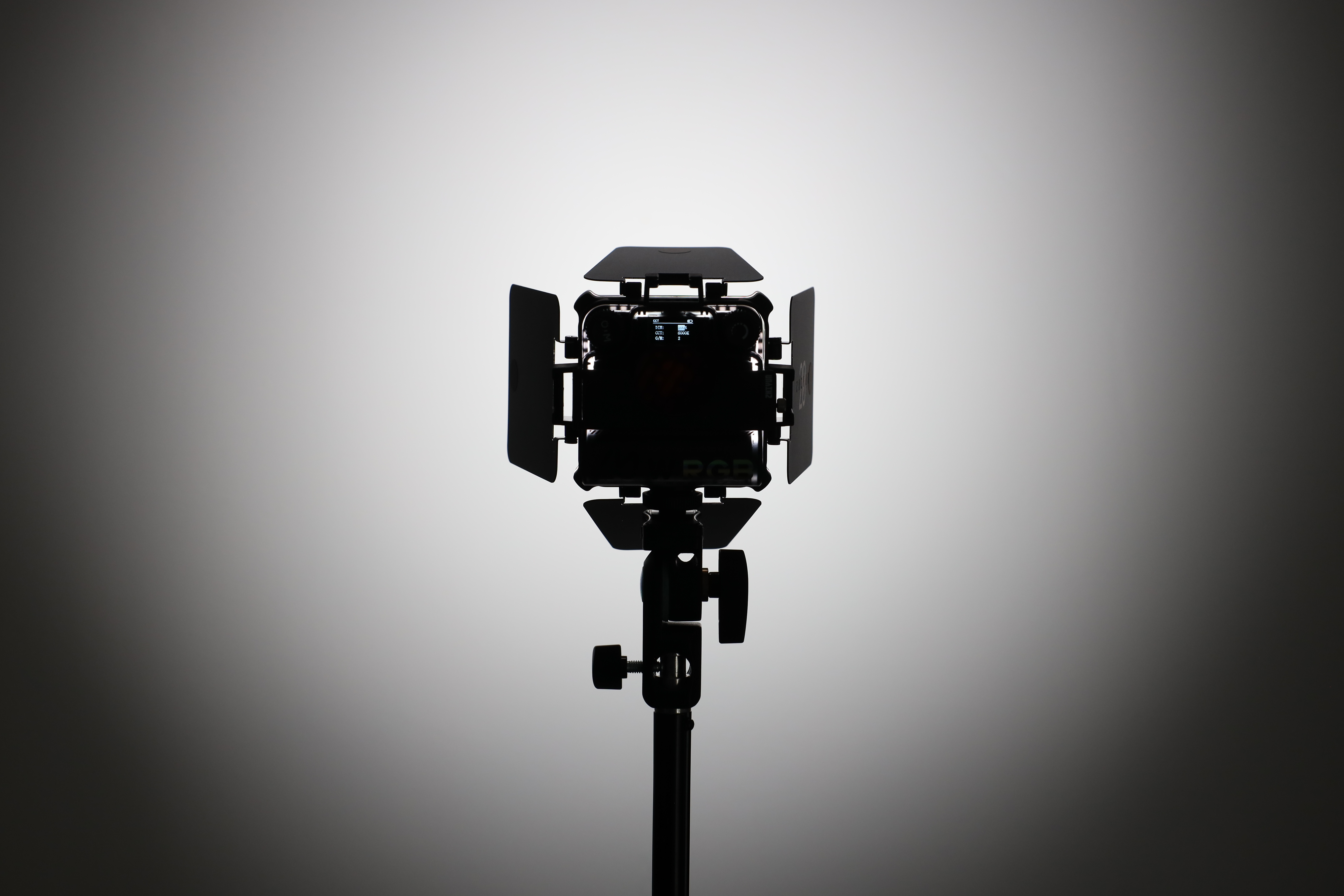
ZY Vega App
The FIVERAY M20C can also connect to Zhiyun’s ZY Vega app which is available for iOS and Android as a free download from the relevant App Stores.
The app works well, the initial setup process was very easy (on Android anyway), with the connection to the light being straightforward once the appropriate permissions are granted. I have used an earlier version of the app and found the interface to be quite buggy, but thankfully Zhiyun seems to have squashed the worst of them, and controlling the M20C went off without a hitch.
The ZY Vega app allows for full Bluetooth control over the M20C, and goes surprisingly in-depth, with a lot of fine-tuning options without ever having to touch the light itself.
Power and Temperature
The Fiveray M20C features the Mark II version of Zhiyun’s signature DynaVort cooling system, which in layman's terms, is a fan and heat sink that keeps the temperature of the light to a manageable level. Zhiyun’s system has always been top-notch, and the M20C is no different, with the light remaining only warm at best – ideal when the light will be handled so much in use. The little orange fan on the rear also makes barely any noise, with a slight perceptible whine when it goes full pelt, but not loud enough to be captured on my footage.
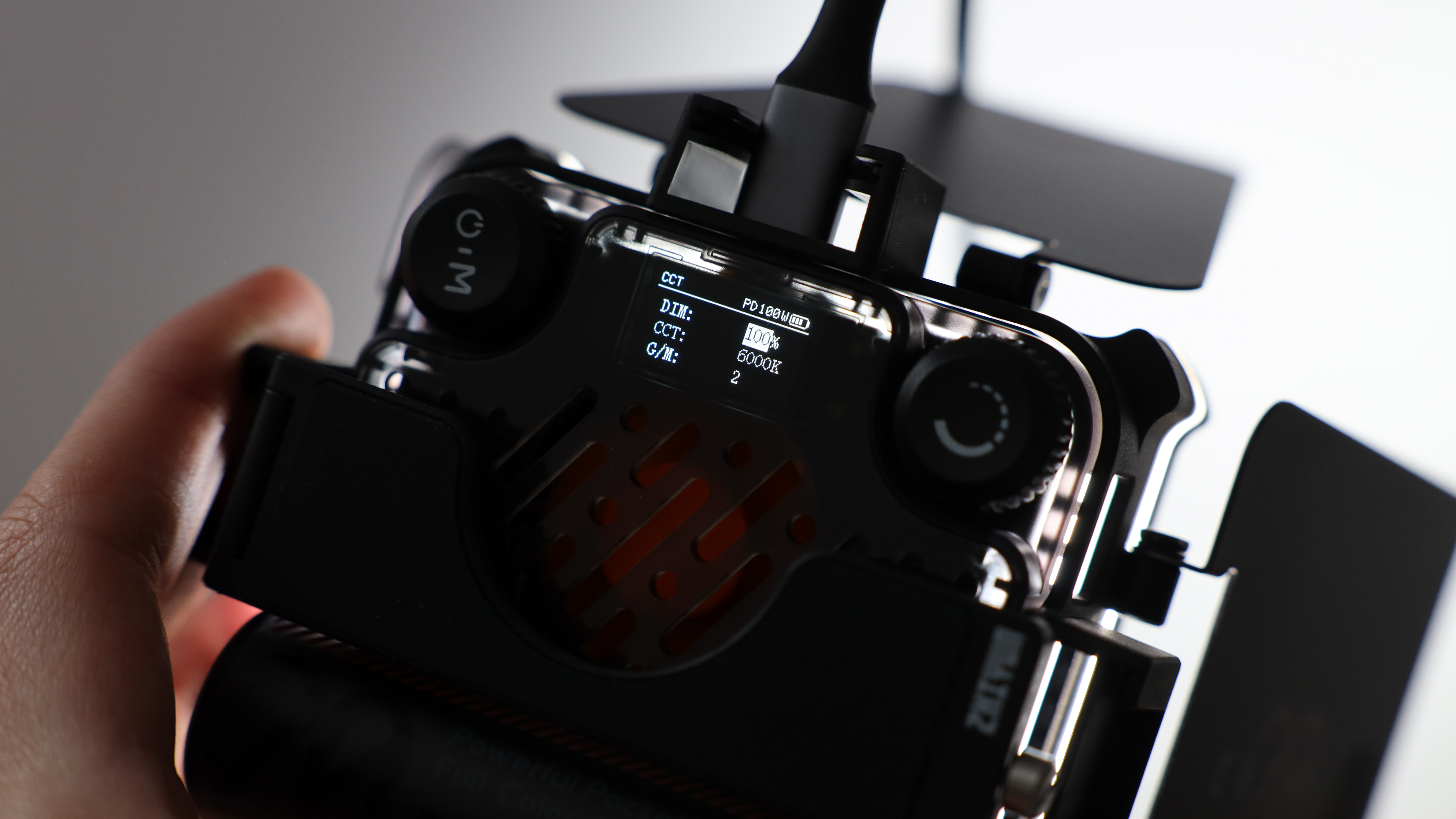
Battery life actually went beyond my meagre expectations with batteries always one of the weakest features with LED panel lighting. The battery easily lasted me for a couple of hours using the M20C at less than 50%, and when pushing the light up to 100% power, I managed to get around 45 minutes of power. The M20C can also be powered by a USB-C PD connection if you run out of juice, either straight from the wall or connected to a power bank with a high enough output.
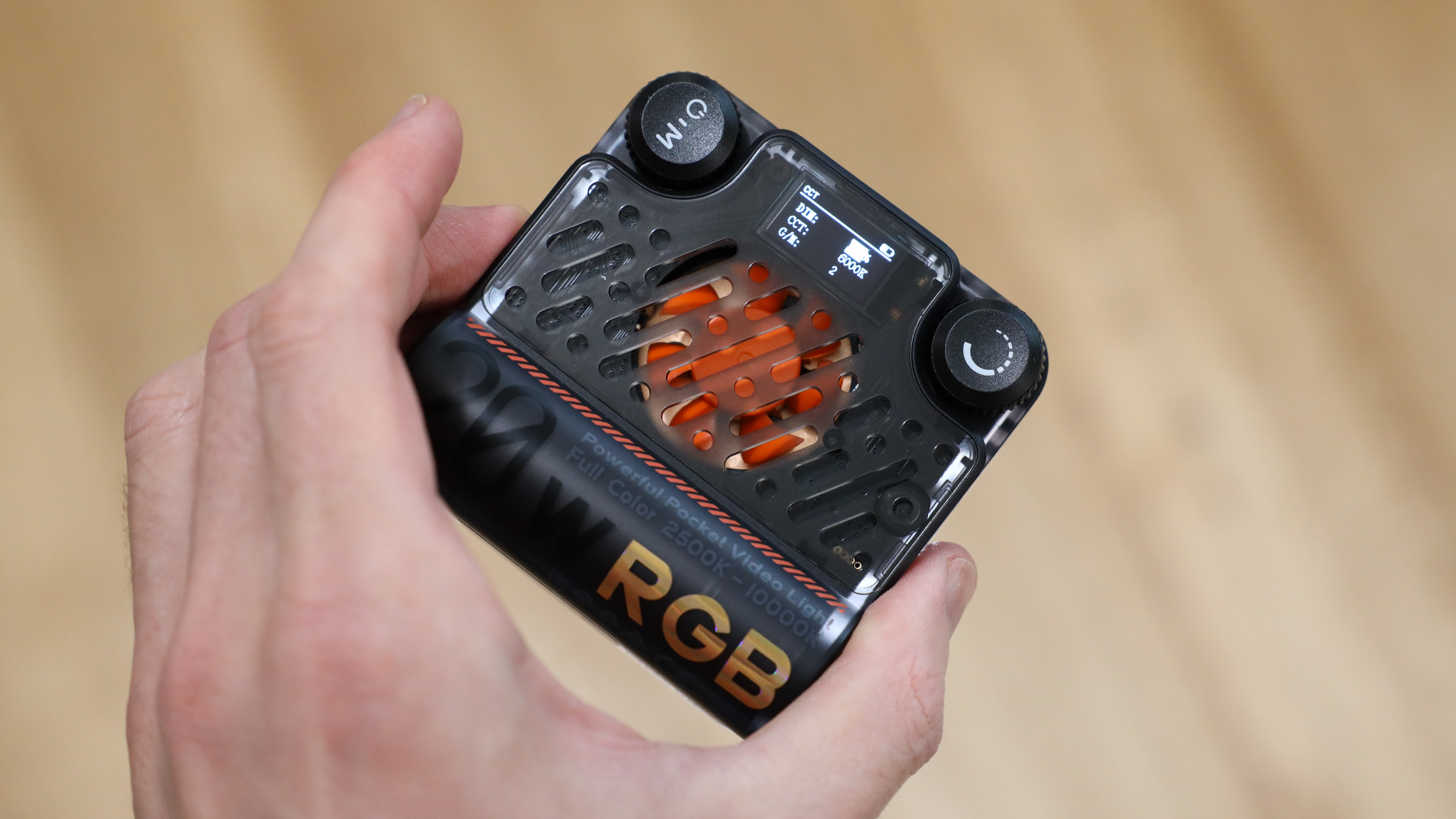
One quirk I did find with the USB-C charging, is a couple of the more powerful chargers/cables I used were able to power the light just fine when it was on, but were not able to charge the battery when the light was off, causing the M20C to make a strange high pitch beeping whine sound and just flash the battery logo at me. I managed to just swap to a lower-powered charger which worked fine, but I found this a slightly odd behaviour.
Zhiyun FIVERAY M20C: Verdict
While the FIVRAY M20C cannot match the best COB lights for raw power, it more than makes up for that in its features – offering practically everything any creative could want in a small LED light panel. There is very little that lets this light down, and it really should be on the wishlist of any vlogger, YouTube creator, or filmmaker.
The brightness is more than enough for close-up work such as vlogging, portraits, or product photography, but the M20C really shines (pun very much intended), when it comes to creative work with a full HSI color spectrum, creative lighting effects, and precise color tuning.
The build quality is exceptional, I love features like the magnetic attachments, both to stick the light to metallic surfaces and also to attach light shaping accessories to the front of the light. Battery life is decent for an LED panel, lasting hours if used conservatively, and with backup USB-C PD power, it can go for much longer.
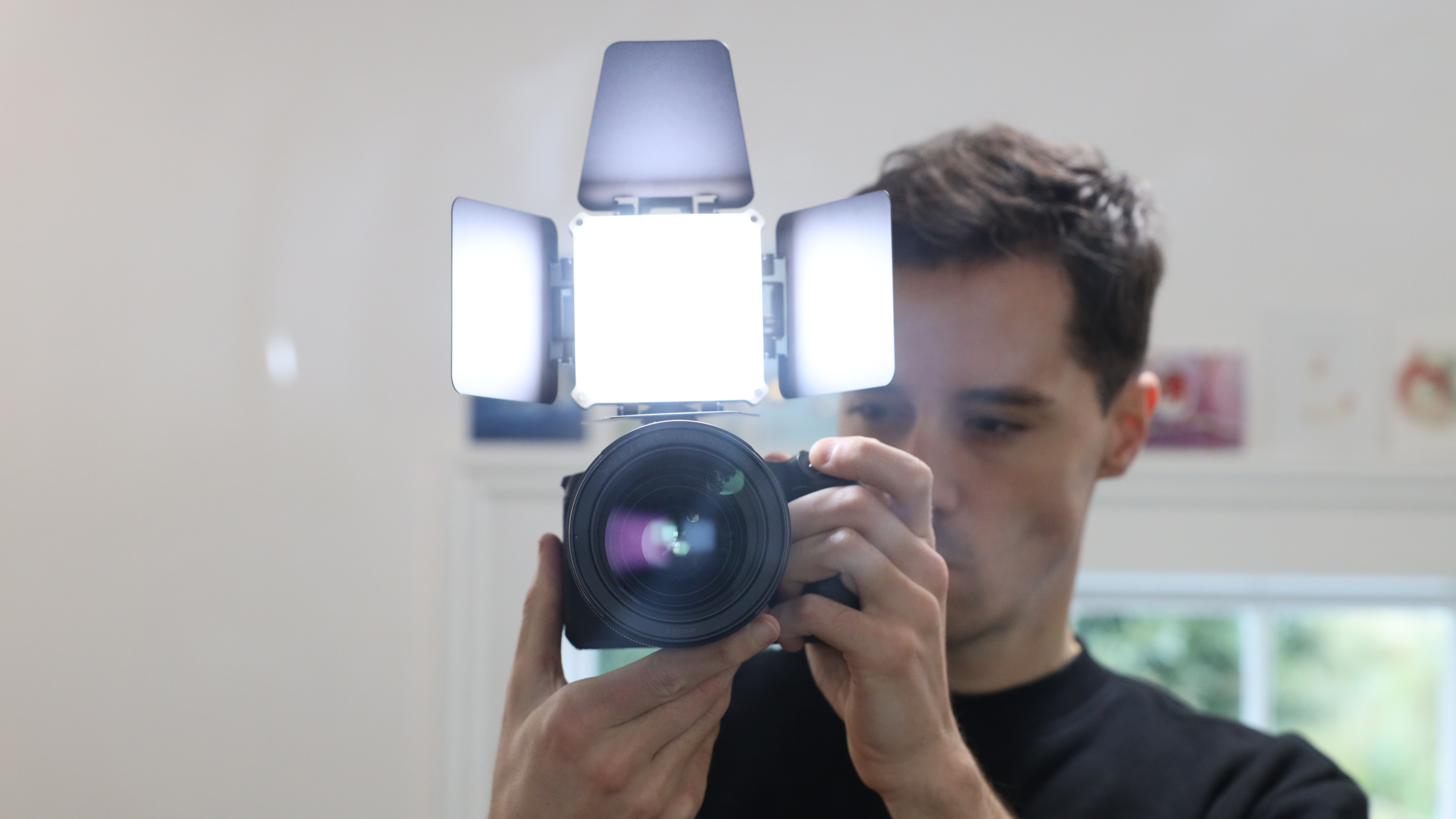
Should I buy the Zhiyun FIVERAY M20C?
✅ Buy it if...
- You want a small and compact light for easy transportation
- You want creative lighting effects
- You want full-color spectrum creative lighting
⛔️ Don't buy it if...
- You at powerful light for a large space
- You want a light compatible with standard light-shaping adapters
- You don’t need battery power
Alternatives
Zhiyun MOLUS X100
The Zhiyun MOLUS X100 is my favorite light right now for video making. Very powerful, but also so compact it doesn’t take up much space in a kit bag. The light can also be powered by a 100W battery pack or USB-C PD connection. The X100 however lacks the effects and colors of the M20C.
Zhiyun FIVERAY F100
The Zhiyun FIVERAY F100 is a light wand, offering a different take on lighting but still with all the effects and colors of the M20C. Light wands are more versatile than a classic boxy light and can go in places other lights can't, while providing a powerful but even spread of light over a wider area.

Gareth is a photographer based in London, working as a freelance photographer and videographer for the past several years, having the privilege to shoot for some household names. With work focusing on fashion, portrait and lifestyle content creation, he has developed a range of skills covering everything from editorial shoots to social media videos. Outside of work, he has a personal passion for travel and nature photography, with a devotion to sustainability and environmental causes.
